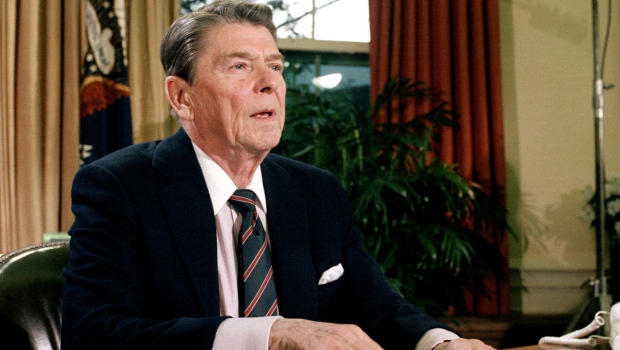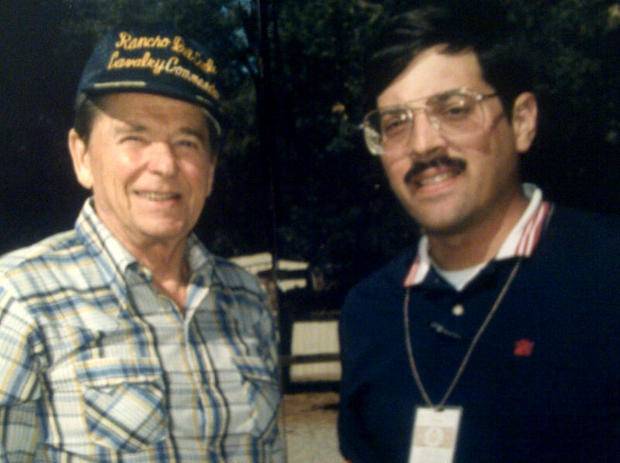Ronald Reagan: What He Would Think of His 100th Birthday
From the Ronald Reagan Library in California to his birthplace, Tampico, Illinois, the celebration of the centennial of the 40th president's birth is underway. Reagan would have been 100 today, February 6.
Along with the official tributes and speeches, the late president is being remembered with books, souvenir jelly beans, concerts, a commemorative postage stamp and other events and products. The Republican National Committee has even asked supporters to "join in the Centennial Celebration by signing our birthday card to President Reagan." The e-mailed pitch for "a special gift of $25, $50, $100 or more" also invites people to maintain the Reagan legacy by "using the Twitter hashtag #Reagan100."
Not surprisingly, as the next election cycle cranks up, Republican hopefuls are trying to grab on to the Reagan legacy.
As Reagan would have commented, "Well, there you go again."
Palin: America Out of Step with Reagan Values
Ron Reagan: No Link Between Palin and My Dad
Ronald Reagan would have approached this milestone by proclaiming he was 39 for the 61st time. It was one of the formulations he used every February 6. The oldest man ever elected to the White House always had a steady supply of quips about his age. At a 1986 White House dinner, he joked, "I'm beginning to notice that every time they bring out my birthday cake, the top of it is beginning to look more and more like a torchlight parade."
In the 1984 presidential debate with Walter Mondale, Reagan said, "I want you to know that also I will not make age an issue in this campaign. I am not going to exploit for political purposes my opponent's youth and inexperience."
In his 1987 State of the Union speech, he strayed from his prepared text to say, "I am delighted you are celebrating the 100th birthday of the Congress. It's always a pleasure to congratulate someone with more birthdays than I've had."
(At left, Peter Maer and other CBS News correspondents and producers tell their best stories about Reagan)
It was all part of the well-honed Reagan effort to be seen as "a regular guy." He famously described himself as "Mr. Norm" in a 1942 story in the movie fan magazine "Photoplay." Biographer and veteran journalist Lou Cannon told a recent symposium at the Reagan Library, "Ronald Reagan's secret weapon in my view was that he was almost ego-less. He could tell all those jokes about himself."
Cannon recalled a Reagan favorite: "No one ever died of hard work but I figured why take a chance." Cannon said Reagan was "largely responsible for the underestimation of Ronald Reagan." The jokes about his age and his early career as a B-movie actor were part of that strategy. I believe it all went back to his Midwestern roots. While Reagan was certainly a complex person, in many ways he still retained the "regular guy" core from his days in Illinois.
Ronald Reagan Myth Doesn't Square with Reality
Reagan: The "60 Minutes" Interviews, 1975-1989
Reagan's age was on my mind when I met him for the first time in March of 1986. Shortly after I was assigned to the White House beat, I was invited to a "meet and greet" for the president and a few journalists. Soon after the gathering started, Reagan removed his new hearing aid. He explained it used the latest technology to screen out extraneous noise. He told us how he lost hearing in his right ear while filming a movie. The president said another actor fired a .38 caliber (blank) pistol next to his head. He recalled the incident taught him the real meaning of the word "concussion."
I made a mental note of how Ronald Reagan was surprisingly physically fit for a man of his age. The doctors who treated him for the gunshot wound he suffered in the 1981 assassination attempt said his physical condition aided his recovery.
The White House social session also included an up-close look at the Reagan world view, especially his observations about the Soviet Union. Reagan explained something that he later mentioned in other settings - how he dreamed of showing "the real America" to then-Soviet leader Mikhail Gorbachev."
(At left, Reagan's interviews on "60 Minutes" through the years)
He wanted to take Gorbachev on a Marine One helicopter trip to Camp David. From the air, he would show the Soviet leader the houses with swimming pools, cars, motorboats and RVs. He would explain how capitalism really worked. He even described a far-fetched scenario where he and Gorbachev would knock on a door and ask the homeowner to explain what they did for a living.
He wanted to show Gorbachev stores with no Soviet-style food lines. While I doubt that it ever came close to playing out as Reagan planned, he likely shared those values with Gorbachev on more than one occasion. While President Reagan went on to develop an historic working relationship with Gorbachev, back in 1986 he made it clear that he viewed the Soviet leader as a dedicated one-world communist.
I had a more light-hearted conversation with President Reagan in 1987 at his beloved Rancho del Cielo, the "Ranch of the Sky" in the Santa Ynez mountain range north of Santa Barbara, California. When a radio producer missed a flight to California, I was assigned to represent the networks at Reagan's weekly Saturday radio speech to the nation.
The speeches were a big deal for the president who started his career as a young radio announcer in Iowa. When he was at the ranch, Reagan delivered the speeches from a special building that housed a radio control room and a studio-like setting where he sat behind the microphone. As he entered the room, he asked, "Who's here from radio?" He summoned me over to his seat where he showed me how he carefully made "hash marks on the script" to mark each 30 seconds of copy. He noted, "I always use a lead pencil to do this." He boasted that it helped him end the broadcast "right on the nose."
While we waited for the on-air time, Reagan told the assembled staffers and this reporter that he always looked forward to Sundays because it meant delivery of "the funnies," the newspaper comic strips. He recalled that "Moon Mullins" was his one of his favorite strips. He also reminded us that his brother, Neil, was affectionately known as "Moon" because people thought he resembled "Moon Mullins." He invited everyone in the room to share their favorite comic character.
Reagan did end that radio speech "right on the nose." To the consternation of a press aide, he then invited me to take a brief tour of the ranch. As we stood on a ridge outside the radio office, he told me how he loved the views of the mountains and the Pacific Ocean in the distance. He described his favorite horse, "El Alamein," a gift from former Mexican President Jose Lopez-Portillo. There were five dogs on the ranch, including a pooch named "Victory."
Reagan pointed to the adobe-style house and a nearby small stable. He was proud of a pond called "Lake Lucky" and the canoe that he dubbed "Truluv." Reporters who covered those vacations rarely, if ever, saw the president. He remained sequestered at the remote ranch far from the media hotels in Santa Barbara. Each day the White House Press Office posted a brief notice advising reporters that the president had started his day having breakfast with Mrs. Reagan. Mornings often included a horseback ride and time to "clear brush." The frequent brush-clearing became something of a joke among reporters who speculated that the president and his ranch hands had removed so much undergrowth that the government had to truck in new supplies.
The record shows Reagan spent 349 days at the ranch during his eight years in office. Some critics poked fun at Reagan for the extended vacations. Like that undergrowth on the ranch grounds, he simply brushed the comments aside.
I've been pondering how Reagan would view all of the hoopla surrounding his birthday centennial. What would he make of the marketing? What would he think of all of the buildings that bear his name, including a massive Washington edifice that represents the very bureaucracy he often derided? How would he handle his supporters' suggestions that his likeness should be placed on a coin, or even on Mount Rushmore?
Former U.S. Attorney General and longtime Reagan associate Edwin Meese insisted, "Ronald Reagan really was not concerned about his legacy. He was not an introspective person and he always figured if he did the right thing, history would take care of itself."
(At left, watch Bill Plante's impression of Reagan)
Presidential historian and CBS News consultant Douglas Brinkley speculated that Mr. Reagan "would have said something to the effect of, 'It's a long ways from being with (B-movie co-star) Bonzo the chimp.'"
Brinkley, editor of The Reagan Diaries, believes "the ham" in Ronald Reagan would have loved the veneration. The presidential scholar told CBS Radio News, "He would have approached it with some humility and I'm sure he would have embraced the fun of it all."
The centennial has brought fresh assessments of the Reagan legacy. Four presidencies and more than two decades after Reagan left office, he remains popular in public opinion polls and among Republicans who seek to stake a claim to his legacy. Presidential historian Brinkley places Ronald Reagan somewhere in the second tier of the top ten presidents. Brinkley says Reagan earned that spot because of his efforts that hastened an end to the Cold War.
Brinkley sees "political momentum" behind the Reagan celebration. He notes Reagan is "the icon for people who define themselves as conservatives. He just so happens to have become their one guy in the game who made it all the way to the White House. "
Peter Maer is a CBS News White House correspondent. You can read more of his posts in Hotsheet here. You can also follow him on Twitter.

